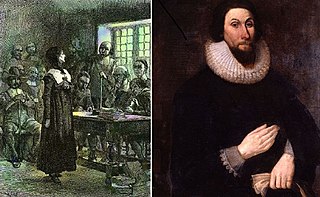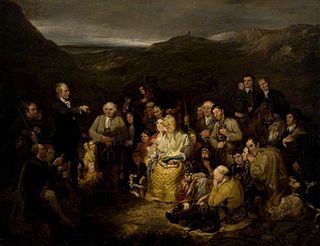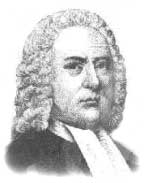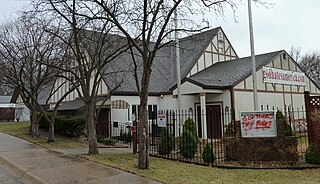 W
WThe Antinomian Controversy, also known as the Free Grace Controversy, was a religious and political conflict in the Massachusetts Bay Colony from 1636 to 1638. It pitted most of the colony's ministers and magistrates against some adherents of the Free Grace theology of Puritan minister John Cotton. The most notable Free Grace advocates, often called "Antinomians", were Anne Hutchinson, her brother-in-law Reverend John Wheelwright, and Massachusetts Bay Governor Henry Vane. The controversy was a theological debate concerning the "covenant of grace" and "covenant of works".
 W
WAsking Jesus into one's heart is a description of personal conversion used in evangelicalism. It is often regarded as a component of the sinner's prayer. Paul Chitwood notes that the concept "does not occur readily before the turn of the twentieth century," but had "become the common way of expressing conversion by the mid-part of the twentieth century." The phrase does not occur in the Bible, and it has frequently been criticized.
 W
WThe Bangorian Controversy was a theological argument within the Church of England in the early 18th century, with strong political overtones. The origins of the controversy lay in the 1716 posthumous publication of George Hickes's Constitution of the Catholic Church, and the Nature and Consequences of Schism. In it, Hickes, as Bishop of Thetford, on behalf of the minority non-juror faction that had broken away from the Church of England after the Glorious Revolution, excommunicated all but the non-juror churchmen. Benjamin Hoadly, the Bishop of Bangor, wrote a reply, Preservative against the Principles and Practices of Non-Jurors; his own Erastian position was sincerely proposed as the only test of truth.
The Bapticostal movement is a movement in some Baptist churches towards adopting certain elements of the charismatic movement. The word Bapticostal is a combination of Baptist and Pentecostal. The term has been used in a limited manner to describe a worship style of high-tempo Contemporary Christian music accompanied with spontaneous shouts, clapping and hand raising. But it also describes those churches where members profess to have and exhibit the charismatic gifts that are practiced in Pentecostalism such as speaking in tongues, being slain in the Spirit, or being granted a word of knowledge. The prevalence of such beliefs within Baptist churches worldwide is unknown. In some unions or conventions it hardly exists but in others it is common. In the United States, it has been estimated that among Southern Baptist churches, 5% of the churches could be classified as Bapticostal, and the numbers are growing. According to a study in 1989, 69% of Baptist churches belonging to the Baptist Union of New Zealand, the main Baptist association in New Zealand, identified positively with the charismatic movement.
 W
WThe "Chute na santa" incident was a religious controversy that erupted in Brazil in late 1995, sparked by a live broadcast of a minister of Universal Church of the Kingdom of God (UCKG), the largest pentecostal church in Brazil, kicking the statue of Our Lady of Aparecida, a Roman Catholic saint.
 W
WA conventicle originally signified no more than an assembly, and was frequently used by ancient writers for a church. At a semantic level conventicle is only a good Latinized synonym of the Greek word church, and points to Jesus' promise in Matthew 18:20, "Where two or three are met together in my name." It came to be applied specifically to meetings of religious associations, particularly private and secret gatherings for worship. Later it became a term of deprecation or reproach, implying that those of whom it was used were in opposition to the ruling ecclesiastical authorities; for example, it was applied to a cabal of mutinous monks in a convent or monastery. Ultimately it came to mean religious meetings of dissenters from an Established Church, held in places that were not recognized as specially intended for public worship or for the exercise of religious functions. It implied that a condition of affairs obtained in which the State made a distinction between a form or forms of religion whose practice and propagation were authorized by statute, and such as were expressly prohibited by enactment. This usage has received legal sanction in Britain.
 W
WThe Fundamentalist–Modernist controversy is a major schism that originated in the 1920s and '30s within the Presbyterian Church in the United States of America. At issue were foundational disputes about the role of Christianity, the authority of Scripture, the death, Resurrection, and atoning sacrifice of Jesus. Two broad factions within Protestantism emerged: Fundamentalists, who insisted upon the timeless validity of each doctrine of Christian orthodoxy, and Modernists, who advocated a conscious adaptation of religion in response to the new scientific discoveries and the moral pressures of the age. At first, the schism was limited to Reformed Protestantism (Calvinism) and centered about the Princeton Theological Seminary, but it soon spread, affecting nearly every Protestant denomination in the United States. Denominations that were not initially affected, such as the Lutheran Church, eventually were embroiled in the controversy, leading to a schism in the Lutheran Church.
 W
WThe history of the Calvinist–Arminian debate begins in early 17th century in the Netherlands with a Christian theological dispute between the followers of John Calvin and Jacobus Arminius, and continues today among some Protestants, particularly evangelicals. The debate centers around soteriology, or the study of salvation, and includes disputes about total depravity, predestination, and atonement. While the debate was given its Calvinist–Arminian form in the 17th century, issues central to the debate have been discussed in Christianity in some form since Augustine of Hippo's disputes with the Pelagians in the 5th century.
 W
WJustification from eternity is a concept within Protestant theology asserting that the justification of a believer takes place at least partially in eternity past.
 W
WIn Anglican Christianity, the "low church" wing of one of the Anglican churches includes those who give relatively little emphasis to ritual, sacraments, and sometimes the authority of clergy. The term is most often used in a liturgical context. "Low church", in a contemporary Anglican context, denotes a Protestant emphasis, and "high church" denotes an emphasis on ritual, often as Anglo-Catholicism.
 W
WThe Marprelate Controversy was a war of pamphlets waged in England and Wales in 1588 and 1589, between a puritan writer who employed the pseudonym Martin Marprelate, and defenders of the Church of England which remained an established church.
 W
WThe Marrow Controversy was a Scottish ecclesiastical dispute occasioned by the republication in 1718 of The Marrow of Modern Divinity. The work consists of religious dialogues which discuss the doctrine of the atonement and aim to guide the reader safely between Antinomianism and Neonomianism.
 W
WThe Old School–New School Controversy was a schism of the Presbyterian Church in the United States of America which took place in 1837 and lasted for over 20 years. The Old School, led by Charles Hodge of Princeton Theological Seminary, was much more conservative theologically and did not support the revival movement. It called for traditional Calvinist orthodoxy as outlined in the Westminster standards.
 W
WThe 2006 video game Resistance: Fall of Man, developed by Insomniac Games, published by Sony Computer Entertainment and released for the PlayStation 3 video game console, features combat scenes that take place within a virtual representation of Manchester Cathedral in England set in an alternate history. It was released on 23 March 2007 in the United Kingdom. The use of images of the cathedral caused controversy with the leaders of the Church of England, which claimed its depiction to be desecration and copyright infringement, and that it was inappropriate of Sony to allow players to fire guns in a city with a gun problem. They have made several legal threats against Sony. They intended to make several demands of Sony, including an apology, a substantial donation, complete withdrawal of the game or modifying the segment featuring the interior of the cathedral, and financial support of Manchester groups trying to reduce gun crime in the city.
 W
WRibbonism, whose supporters were usually called Ribbonmen, was a 19th-century popular movement of poor Catholics in Ireland. The movement was also known as Ribandism. The Ribbonmen were active against landlords and their agents, and opposed "Orangeism", the ideology of the Protestant Orange Order.
 W
WThe Sinner's Prayer is an evangelical Christian term referring to any prayer of repentance, prayed by individuals who feel convinced of the presence of sin in their lives and have the desire to form or renew a personal relationship with God through Jesus Christ. It is a popular prayer in evangelical circles. It is not intended as liturgical like a creed or a confiteor, but rather, is intended to be an act of initial conversion to Christianity. While some Christians see reciting the sinner's prayer as the moment defining one's salvation, others see it as a beginning step of one's lifelong faith journey.
Two-Seed-in-the-Spirit Predestinarian Baptists are part of a larger sub-group of Baptists that is commonly referred to as "anti-mission" Baptists. This sub-group includes the Duck River and Kindred Baptists, Old Regular Baptists, some Regular Baptists and some United Baptists. Only a minuscule minority of Primitive Baptists adhere to the Two-Seed doctrine. The primary centers of Two-Seedism were in Northern Alabama, Arkansas, Eastern Tennessee, Florida, Georgia, Illinois, Indiana, and Texas. As of 2002, five churches or congregations of this faith and order still existed in Alabama, Indiana, Tennessee, and Texas.
 W
WThe vestments controversy or vestarian controversy arose in the English Reformation, ostensibly concerning vestments or clerical dress. It was initiated by John Hooper's rejection of clerical vestiments in the Church of England under Edward VI, and was later revived under Elizabeth I. It revealed concerns within the Church of England over ecclesiastical identity, doctrine and church practices.
 W
WWestboro Baptist Church (WBC) is an American hyper-Calvinist hate group. It is known for engaging in inflammatory homophobic and anti-American pickets, as well as hate speech against atheists, Jews, Muslims, transgender people, and numerous Christian denominations. It is a Baptist church that is not affiliated to any Baptist denomination and has been denounced by the Baptist World Alliance, the Southern Baptist Convention, and other mainstream Christian denominations.